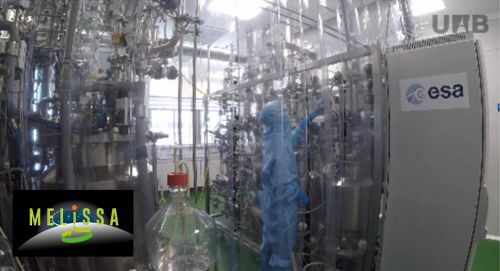
10/04/2019
MELISSA celebra sus 10 años: cuando viajar a Marte se prepara cerca del Barcelona Synchrotron Park
MELISSA celebra sus 10 años: cuando viajar a Marte se prepara cerca del Barcelona Synchrotron Park
La planta piloto del proyecto MELiSSA de la Agencia Espacial Europea (ESA) ubicada en la escuela de ingeniería de la Universidad Autónoma de Barcelona (UAB), socio estratégico del BSP, trabaja en un proyecto de largo recorrido que celebró la semana pasada sus 10 primeros años.
En un viaje de ida y vuelta a Marte, una tripulación de seis miembros necesitaría unas 30 toneladas de comida, oxígeno y agua para los 1.000 días de misión. Una barbaridad que podría reducirse si se pudiera crear un sistema cerrado de reciclaje en bucle del CO2 expirado y de los deshechos producidos por la tripulación para volver a producir oxígeno, agua, alimentos, etc.: esto es el proyecto MELiSSA.
Un proyecto empezado hace ya 30 años y financiado al 60 % por la ESA, 5 millones de euros anuales para el centenar de investigadores implicados de 30 organizaciones de 15 países de Europa. En este puzle, la planta piloto de la UAB, inaugurada en 2009, desempeña un papel central y ha conseguido ya mantener en funcionamiento tres de los seis compartimentos necesarios para completar el ciclo de vida sin aportación exterior en un período largo de tiempo: un biorreactor de nitrificación, un fotobiorreactor de microalgas y un compartimento aislado con una "tripulación" muestra de tres ratas.
¡Veremos cuando los humanos podremos ocupar su lugar!
En un viaje de ida y vuelta a Marte, una tripulación de seis miembros necesitaría unas 30 toneladas de comida, oxígeno y agua para los 1.000 días de misión. Una barbaridad que podría reducirse si se pudiera crear un sistema cerrado de reciclaje en bucle del CO2 expirado y de los deshechos producidos por la tripulación para volver a producir oxígeno, agua, alimentos, etc.: esto es el proyecto MELiSSA.
Un proyecto empezado hace ya 30 años y financiado al 60 % por la ESA, 5 millones de euros anuales para el centenar de investigadores implicados de 30 organizaciones de 15 países de Europa. En este puzle, la planta piloto de la UAB, inaugurada en 2009, desempeña un papel central y ha conseguido ya mantener en funcionamiento tres de los seis compartimentos necesarios para completar el ciclo de vida sin aportación exterior en un período largo de tiempo: un biorreactor de nitrificación, un fotobiorreactor de microalgas y un compartimento aislado con una "tripulación" muestra de tres ratas.
¡Veremos cuando los humanos podremos ocupar su lugar!
Más noticias
14/12/2018
El Open Innovation Forum conecta retos empresariales con soluciones académicas
07/12/2018
Informe Biocat 2017: lo mejor de la BioRegión de Cataluña
30/11/2018
El Barcelona Synchrotron Park comprometido con el crecimiento sostenible
23/11/2018
Astrónomos liderados por el IEEC revelan una supertierra fría alrededor de la estrella de Barnard
16/11/2018
Investigadores del CRAG descubren cómo generar plantas más resistentes a la sequía
08/11/2018
Manifiesto de Barcelona: para una diplomacia de ciencia y tecnología de ciudad









